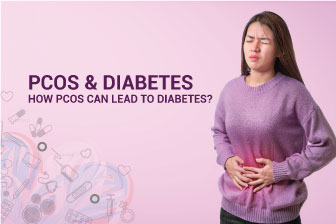Did you know that 50% of women with PCOS are likely to develop type 2 diabetes?
Were you aware that it may affect your chances of conceiving a child?
PCOS – what is it really?
It is a condition in women, wherein they tend to have higher levels of androgens (male hormones, that are also existing in women). This prevents ovulation, which is the cause for irregular periods, acne, excess facial and body hair, and thinning hair on the scalp. They are resistant to insulin, because though their system produces insulin, it cannot be used efficiently, which makes them more prone to type 2 diabetes.
As everything about health is interconnected, women with PCOS are likely to put on weight faster, and eventually deal with more severe health issues.
FACTS YOU SHOULD KNOW:
- Diabetes - More than 50% of women with PCOS are likely to have type 2 diabetes by the time they are in their early 40’s
- Gestational diabetes (diabetes during pregnancy) - It is common for pregnant women to develop diabetes temporarily, while they’re expecting their baby. This, however, raises the risk for both mother and child to get type 2 diabetes in the future.
- Heart disease - A woman with PCOS should always monitor her heart health, as she is more vulnerable.
- High blood pressure - The heart, brain, and kidneys are directly impacted by high blood pressure.
- High LDL (“bad”) cholesteroland low HDL (“good”) cholesterol - are factors that increase the risk for heart disease
- Sleep apnea external icon - This sleep disorder suddenly stops a person’s breathing for a few seconds, while they are asleep, putting the person at a risk for heart disease as well as type 2 diabetes
- Stroke - When plaque (cholesterol and white blood cells) begins to clog blood vessels, it can cause clotting of the blood, which may lead to a stroke
PCOS has also been suggested to have a link to depression and anxiety, but clarity on this is pending.
READ: Polycystic Ovary Syndrome (PCOS)
What leads to PCOS?
These are the primary factors that can lead to PCOS, and eventually to insulin resistance:
- Androgen levels that are higher than normal
- Excess weight
- Family history
Excess Weight
Is being overweight the cause PCOS? Can PCOS make you put on excess weight?
So far there is no direct correlation between being overweight and having PCOS, as it may depend on many other factors like genetics, family history and lifestyle habits.
Family History…
If a woman’s immediate female family member (mother/sister) has PCOS or type 2 diabetes, she may be more prone to developing PCOS and Insulin Resistance.
INSULIN RESISTANCE: What you should know:
- Lifestyle and day to day habits can impact one’s insulin resistance
- An unhealthy diet, lack of sleep or physical activity may be a factor
- It can run in the family
What can you do about it?
Apart from realigning your eating habits and sleeping schedules, one should attempt to shed some kilos. This will have an overall benefit, as several parameters will come in the normal range, and symptoms may subside.
How Do You Know If You Have PCOS?
While some symptoms may be obvious, others may not be so.
If you notice acne, hair growth, or darkening of the skin in body creases and folds – such as the back of the neck (acanthosis nigricans), please consult a dermatologist.
You should see a trusted gynecologist (doctor who treats medical conditions that affect women and their reproductive organs) for irregular monthly periods, and your family doctor if you are suddenly putting on weight.
Some women may have just one or two symptoms, while others might develop nearly all of them. Women of every race and ethnicity are prone to developing PCOS.
Usually, PCOS can begin in girls soon after their first menstrual cycle, around the age of 11 or 12. In some cases it may occur in their 20’s or 30’s. However, it is only when a woman is trying to conceive and faces challenges, that she may discover that she has PCOS.
Your doctor will need to check whether you have at least 2 of these 3 major symptoms:
- Irregular or no periods, due to lack of ovulation
- Excess male hormones (more than normal range) which leads to overgrowth of facial or body hair or thinning scalp hair
- Multiple small cysts on the ovaries
An ovarian cyst is not an indicator for PCOS. Not all women with cysts would be diagnosed with PCOS, and vice versa.
What is the treatment for PCOS?
If you notice any of the above symptoms, or are unable to easily conceive, it is best to see your doctor and get a proper diagnosis. In case PCOS shows up, then immediately have your blood sugar levels checked. Timely intervention is the best medication.
Your doctor will guide you about managing your health conditions. This may include lifestyle changes, dietary changes and weight loss. These will help to keep your parameters close to normal, while offering you a better chance at becoming pregnant. Your doctor may also prescribe medicines that will help you ovulate, while reducing your acne and abnormal hair growth.
Take the time to understand your condition, by discussing it at length with your doctor, before considering treatment options available to you.



